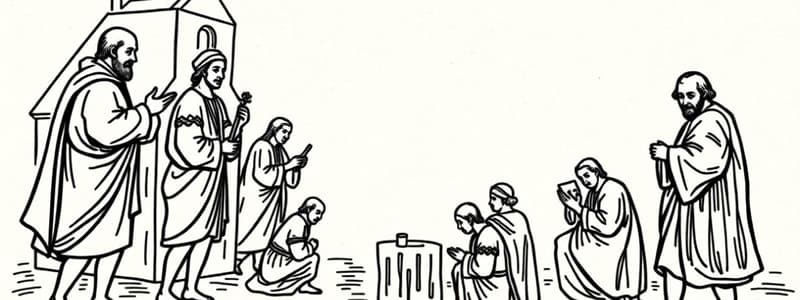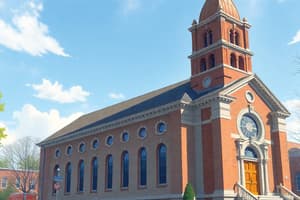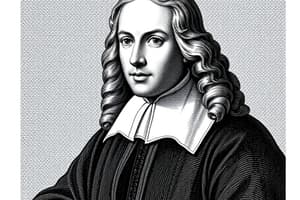Podcast
Questions and Answers
What was one of the main issues among Baptists in the 17th century?
What was one of the main issues among Baptists in the 17th century?
Benjamin Keach was opposed to the practice of singing hymns in church.
Benjamin Keach was opposed to the practice of singing hymns in church.
False
What was the name of the group that formed after members left Keach's church over hymn singing?
What was the name of the group that formed after members left Keach's church over hymn singing?
Maze Pond
According to the debates, closed membership and _____ membership were a second significant issue among Baptists.
According to the debates, closed membership and _____ membership were a second significant issue among Baptists.
Signup and view all the answers
Match the following key figures with their contributions or beliefs:
Match the following key figures with their contributions or beliefs:
Signup and view all the answers
What prompted some Baptists to avoid singing hymns altogether?
What prompted some Baptists to avoid singing hymns altogether?
Signup and view all the answers
The 1677 confession took a definitive stance on open versus closed membership.
The 1677 confession took a definitive stance on open versus closed membership.
Signup and view all the answers
What is the hallmark of Hyper-Calvinism?
What is the hallmark of Hyper-Calvinism?
Signup and view all the answers
Particular Baptists fully embraced the revival happening in England during the early 18th century.
Particular Baptists fully embraced the revival happening in England during the early 18th century.
Signup and view all the answers
Who were the two Particular Baptists mentioned that influenced the Hyper-Calvinistic views?
Who were the two Particular Baptists mentioned that influenced the Hyper-Calvinistic views?
Signup and view all the answers
The chilling effect of __________ had an impact on the thinking of some Particular Baptists churches.
The chilling effect of __________ had an impact on the thinking of some Particular Baptists churches.
Signup and view all the answers
Match the following individuals with their contributions to Hyper-Calvinism:
Match the following individuals with their contributions to Hyper-Calvinism:
Signup and view all the answers
Which of the following statements best describes Biblical Calvinism?
Which of the following statements best describes Biblical Calvinism?
Signup and view all the answers
Spurgeon believed that the theology associated with John Gill had a positive impact on churches.
Spurgeon believed that the theology associated with John Gill had a positive impact on churches.
Signup and view all the answers
What position did John Eve hold in the Baptist church in Soham in 1752?
What position did John Eve hold in the Baptist church in Soham in 1752?
Signup and view all the answers
Many early Particular Baptists believed that Christ should be offered only to those who showed signs of __________.
Many early Particular Baptists believed that Christ should be offered only to those who showed signs of __________.
Signup and view all the answers
Who was the pastor of the church after Samuel Stennett?
Who was the pastor of the church after Samuel Stennett?
Signup and view all the answers
Thomas Waters resigned as pastor in 1815 after experiencing a time of blessing followed by decline.
Thomas Waters resigned as pastor in 1815 after experiencing a time of blessing followed by decline.
Signup and view all the answers
In what year did Benjamin Coxhead baptize 28 people?
In what year did Benjamin Coxhead baptize 28 people?
Signup and view all the answers
Samuel Stennett was a strict __________ who opposed the revival.
Samuel Stennett was a strict __________ who opposed the revival.
Signup and view all the answers
Match the church to its historical fact:
Match the church to its historical fact:
Signup and view all the answers
What was one result of churches coming under a lack of evangelism and missions?
What was one result of churches coming under a lack of evangelism and missions?
Signup and view all the answers
In the early 18th century, the term 'enthusiastic' meant being zealous or fervent about something.
In the early 18th century, the term 'enthusiastic' meant being zealous or fervent about something.
Signup and view all the answers
Who denounced George Bell for claiming he had the power to heal and prophesy?
Who denounced George Bell for claiming he had the power to heal and prophesy?
Signup and view all the answers
The term 'enthusiasm' in the 18th century referred to an imbalanced religious __________.
The term 'enthusiasm' in the 18th century referred to an imbalanced religious __________.
Signup and view all the answers
Match the following individuals with their viewpoints on emotionalism:
Match the following individuals with their viewpoints on emotionalism:
Signup and view all the answers
What did Whitefield argue regarding inner impressions?
What did Whitefield argue regarding inner impressions?
Signup and view all the answers
The 18th-century climate favored religious excitement and fervor.
The 18th-century climate favored religious excitement and fervor.
Signup and view all the answers
What was the danger associated with emotionalism that individuals were warned against?
What was the danger associated with emotionalism that individuals were warned against?
Signup and view all the answers
True Christianity is said to be __________, impacting the mind, will, and emotions.
True Christianity is said to be __________, impacting the mind, will, and emotions.
Signup and view all the answers
Which of the following describes the emotional expressions viewed negatively by some groups?
Which of the following describes the emotional expressions viewed negatively by some groups?
Signup and view all the answers
What are the two key aspects emphasized in the worship of God?
What are the two key aspects emphasized in the worship of God?
Signup and view all the answers
Reverence and joy contradict each other in the context of worship.
Reverence and joy contradict each other in the context of worship.
Signup and view all the answers
Name one of the works by Jonathan Edwards that addresses the subject of worship.
Name one of the works by Jonathan Edwards that addresses the subject of worship.
Signup and view all the answers
The power of _____ truth, rightly comprehended, can produce extraordinary emotions in worship.
The power of _____ truth, rightly comprehended, can produce extraordinary emotions in worship.
Signup and view all the answers
Match the following individuals or terms with their respective contributions or associations:
Match the following individuals or terms with their respective contributions or associations:
Signup and view all the answers
How many angles does the speaker want to consider regarding the changes in Particular Baptist Churches?
How many angles does the speaker want to consider regarding the changes in Particular Baptist Churches?
Signup and view all the answers
Extraordinarily high emotions in worship are always considered improper.
Extraordinarily high emotions in worship are always considered improper.
Signup and view all the answers
What is one of the principles to keep in mind regarding worship mentioned in the content?
What is one of the principles to keep in mind regarding worship mentioned in the content?
Signup and view all the answers
Andrew Fuller was a notable _____ within the Particular Baptist context.
Andrew Fuller was a notable _____ within the Particular Baptist context.
Signup and view all the answers
Which of the following is NOT one of the principles mentioned in the context?
Which of the following is NOT one of the principles mentioned in the context?
Signup and view all the answers
Study Notes
Lecture 72: Particular Baptists and the Evangelical Revival in Great Britain, part 2
- Particular Baptists, a Calvinistic/Reformed Baptist group, grew out of the English Reformation.
- Their distinctive doctrine includes particular redemption.
- The 1689 London Baptist Confession of Faith is a key document for Reformed Baptists.
- Particular Baptist churches emerged in the 17th century, expanding from the Puritan movement.
- By the mid-1640s, there were seven churches in London.
- By the late 1650s, there were approximately 131 Particular Baptist churches throughout England, Wales, and Ireland.
- A period of persecution followed the restoration of the monarchy in 1660, but the group continued to grow.
- The Act of Toleration in 1689 brought new religious liberty, but Baptist churches started declining toward the 1750s, decreasing from around 220 churches to about 150.
Controversies over More or Less Minor Issues
- After the Act of Toleration, theological and personal differences among Baptists increased.
- Disagreements over congregational singing (including "uninspired" hymns) and open vs. closed communion divided the churches.
- Disputes were often divisive and mean-spirited.
- Figures like Isaac Marlow wrote extensively on the issue of congregational singing.
The Negative Attitude toward the Evangelical Revival
- The Particular Baptists were often resistant to the evangelical revival of the 1730s and 1740s, largely due to leaders being members of the Church of England.
- Baptists were suspicious of the revival's leaders and the perceived connection to a denomination they considered non-scriptural.
- Concerns about the focus on emotion and the outward expressions of the revival, and concerns about the implications of this emphasis on the doctrines of the faith.
- Concerns over the appropriateness of the methods used in the revival by figures like Whitefield and Wesley.
Studying That Suits You
Use AI to generate personalized quizzes and flashcards to suit your learning preferences.
Description
Explore the key issues, debates, and figures that shaped the Baptist movement in the 17th century. This quiz covers topics like hymn singing, membership debates, and the influence of Hyper-Calvinism. Test your knowledge on the important developments and controversies among Baptists during this pivotal period.





